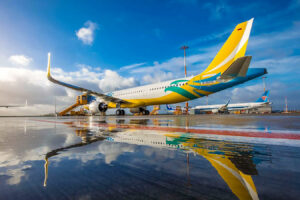By Ashley Erika O. Jose, Reporter
BUDGET CARRIER Cebu Pacific (CEB) has agreed to buy up to 152 A321 new engine option (NEO) aircraft from European planemaker Airbus, valued at P1.4 trillion or $24 billion, marking the largest aircraft order in the Philippines.
“The order is designed to provide Cebu Pacific with maximum flexibility to adapt fleet growth to market conditions, with the ability to switch between the A321neo and A320neo,” Cebu Air Chief Executive Officer Michael B. Szucs told the stock exchange on Tuesday.
The airline, operated by Cebu Air, Inc., did not specify a timeline for the arrival of its aircraft order, as the agreement with Airbus is expected to be finalized in the third quarter.
The budget carrier said that it has selected Pratt & Whitney GTF engines to power the aircraft, despite previously reported issues with the engine manufacturer. The agreement will include orders for up to 102 A321neo and 50 A320neo aircraft.
According to Airbus’ website, the A321neo is the aerospace company’s longest-fuselage aircraft, capable of seating up to 244 passengers.
Meanwhile, the A320neo is touted as Airbus’ “most comfortable” short-to-medium-haul aircraft, accommodating a maximum of 194 passengers.
Airbus’ NEO aircraft is known for its enhanced fuel efficiency, representing the latest generation of Airbus planes designed to be highly compatible with sustainable aviation fuel (SAF).
Currently, all Airbus aircraft are certified to operate with up to a 50% SAF blend, aligning with Cebu Pacific’s goal of integrating green fuel across its network.
“When finalized, the deal will be a significant milestone for the local airline industry and a testament to CEB’s unwavering commitment to support the Philippine growth story,” Mr. Szucs said.
With the purchase, Cebu Pacific will more than double its current fleet. Currently, the budget carrier operates a fleet of 73 Airbus and ATR aircraft.
The airline currently serves 35 domestic and 24 international destinations across Asia, Australia, and the Middle East.
Cebu Air reported a P2.24 billion attributable net income for the first quarter, more than doubling last year’s P1.08 billion.
First-quarter revenues surged to P25.3 billion, representing a 21.2% increase from P20.88 billion previously.
The airline previously said that its aircraft order would enable it to increase capacity and passenger volume.
For the first quarter, Cebu Pacific’s passenger revenues increased to P17.83 billion, up by 24.8% from the P14.29 billion a year ago, due to the overall increase in travel demand.
The company saw a significant increase in its passenger volume to a total of 5.5 million in the first three months of the year from only 4.8 million previously.
“Good that CEB is expanding. It will improve revenues and in line with increased tourism also,” BDO Capital & Investment Corp. President Eduardo V. Francisco said in a Viber message.
Regina Capital Development Corp. Head of Sales Luis A. Limlingan said Cebu Pacific’s move is a strategic decision to cater to its service and route expansion plans.
“This entails substantial capital expenditure and potential financing hurdles, still it can be viewed to offer long-term benefits such as improved operational efficiency, reduced costs, and enhanced market position,” Mr. Limlingan said.
He said the move, though requires significant capital expenditure and “potential financing hurdles,” could offer long-term benefits as it is set to enhance the company’s operational efficiency.
“This move is likely to boost investor confidence by signaling growth potential, though its impact on profitability will depend on successful execution and broader macroeconomic backdrop,” he added.
For her part, First Metro Investment Corp. Head of Research Cristina S. Ulang said in a Viber message: “Definitely positive for long-term P&L (profit and loss) and growth outcome.”
Aside from the recently signed aircraft order, Cebu Pacific is also expecting to receive 17 aircraft in 2024.
Last month, Cebu Pacific said it had received its turboprop aircraft, marking its sixth aircraft delivery for the year.
At the local bourse on Tuesday, shares in the company gained 10 centavos or 0.37% to end at P27.20 each.
